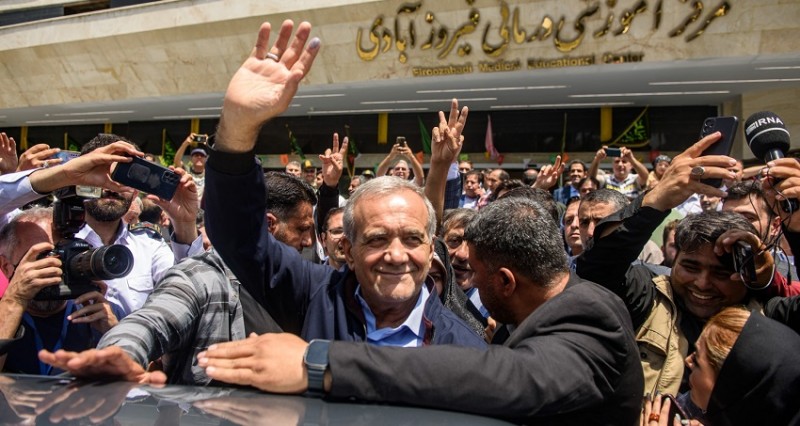
TEHRAN: Reformist candidate Masoud Pezeshkian has won the Iranian presidential runoff election against ultraconservative Saeed Jalili, according to state media reports. The interior ministry announced that out of more than 30 million votes counted, Pezeshkian received over 17 million, while Jalili garnered more than 13 million.
Polling stations closed at midnight in Iran after being extended three times for a total of six extra hours. This election followed a June 28 ballot with a historically low turnout, where over 60% of Iranian voters abstained from voting after the unexpected death of former President Ebrahim Raisi in a helicopter crash.
Pezeshkian, a low-key lawmaker and the sole moderate among the original four candidates, faced a tight race against Jalili, a hard-line former nuclear negotiator who advocates strengthening ties with Russia and China.
While the election is unlikely to significantly change the Islamic Republic's policies, the new president will play a crucial role in selecting a successor to Ayatollah Ali Khamenei, Iran's 85-year-old Supreme Leader.
Ayatollah Khamenei commented on the higher zeal and interest of voters in this round compared to the previous one. He had previously acknowledged the lower than expected turnout but emphasized that abstention did not imply opposition to Islamic rule.
Voter turnout has significantly decreased over the past four years, indicating waning support for clerical rule amidst economic hardships and restrictions on political and social freedoms. Only 48% of voters participated in the 2021 election, which brought Raisi to power, and turnout was just 41% in a parliamentary election in March.
This election took place against a backdrop of escalating tensions in the Middle East, including the conflict between Israel and Iranian allies Hamas and Hezbollah, and increased Western pressure on Iran over its nuclear program.
Iran's Revolutionary Guard Aerospace chief Amirali Hajizadeh urged people to vote, likening each vote to a missile launch against enemies. Despite skepticism about Pezeshkian's ability to deliver on campaign promises, his victory may lead to a more pragmatic foreign policy and improve prospects for social liberalization and political pluralism.
Many Iranians, however, remain skeptical. Afarin, a 37-year-old beauty salon owner in Isfahan, voted for Pezeshkian, considering him a better option than a hard-liner, while Sepideh, a 19-year-old university student in Tehran, refused to vote, citing dissatisfaction with the Islamic Republic.
The hashtag #ElectionCircus trended on social media, with activists calling for an election boycott to delegitimize the Islamic Republic. Both candidates had pledged to revive Iran's struggling economy, plagued by mismanagement, corruption, and sanctions reimposed since 2018 after the U.S. withdrawal from the nuclear deal.
Retired employee Mahmoud Hamidzadegan, 64, from Sari, voted for Jalili, who promised to uphold Islamic values and address economic hardships.
Iran's Presidential Runoff Features Hard-Line Negotiator vs Reformist Lawmaker
Iranian Officials Mobilize Voters Ahead of Friday Runoff
Russia and Iran Set to Finalize New Comprehensive Cooperation Agreement Soon